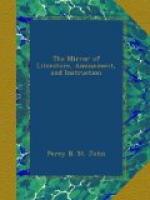THE MIRROR OF LITERATURE, AMUSEMENT, AND INSTRUCTION.
Vol. 17, No. 487.] Saturday, April 30, 1831. [Price 2d.
* * * * *
[Illustration: Birthplace of Locke.]
At the village of Wrington, in Somersetshire, in a cottage by the churchyard, was born John Locke. What a simple, unostentatious record is this of him whom the biographers call “one of the most eminent philosophers and valuable writers of his age and country.” Yet the cottage is not preserved with any special care;—there is nothing about it to denote that within its walls the man of whom every Englishman is proud—first drew breath. The house is now divided into tenements; and, fortuitously, one of its rooms is used as a school for young children. It is grateful to know this, even were it only for associating the appropriation of this apartment with the master-mind of Locke, as developed in his “Thoughts on Education,” and his perspicuous “Essay on the Human Understanding.”
Locke was born August 29, 1632: his father, Mr. J. Locke, who was descended from the Lockes of Charton Court, in Dorsetshire, possessed a moderate landed property at Pensfold and Belluton, where he lived. He was a captain in the Parliamentary army during the civil wars, and his fortune suffered so considerably in those times, that he left a smaller estate to his son than he himself had inherited. It is not our intention to follow the biographers of Locke further than by quoting from the last published Life of the Philosopher[1] a brief example of his filial affection:—
[1] The Life of John Locke,
with Extracts from his Correspondence,
Journals,
and Commonplace Books. By Lord King. New
Edition.
2
vols. 8vo. 1830.
John Locke, says the biographer, was the eldest of two sons, and was educated with great care by his father, of whom he always spoke with the greatest respect and affection. In the early part of his life, his father exacted the utmost respect from his son, but gradually treated him with less and less reserve, and, when grown up, lived with him on terms of the most entire friendship; so much so, that Locke mentioned the fact of his father having expressed his regret for giving way to his anger, and striking him once in his childhood, when he did not deserve it. In a letter to a friend, written in the latter part of his life, Locke thus expresses himself on the conduct of a father towards his son:—“That which I have often blamed as an indiscreet and dangerous practice in many fathers, viz. to be very indulgent to their children whilst they are little, and as they come to ripe years to lay great restraint upon them, and live with greater reserve towards them, which usually produces an ill understanding between father and son, which cannot but be of bad consequences;




